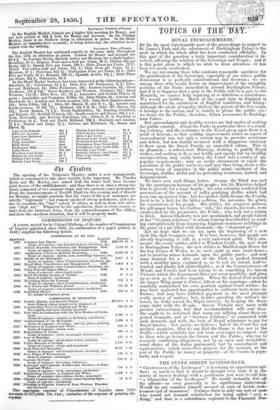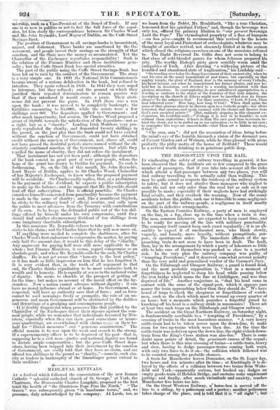THE CUFFE STREET SAVINGS-BANK.
" CHANCELLOR of the Exchequer" is becoming an opprobrious ep4-" thet ; so much so that it would be thought very rude if in the course of money dealings with a gentleman you were to call him " a Chancellor of the Exchequer.' He would instantly feel all the affront-so very generally is its significance understood. Would he not consider himself accused at once of lavish reek-, lessness and of meanness ? Perhaps there is only 'one sort of man, who would not demand satisfaction for being called " such a thing," and that is- a subordinate aspirant to the Financial Pro, miership, such as Vice-President of the Board of Trade. If any one is so new in polities as not to feel the full force of the asper- sion, let him study 'the correspOndenee between Sir Charles Wood and 'Mr. John Reynolds, Lord Mayor of Dublin, on the Cuffe Street Savings-Bank. The position of Ciovernment to all savings-banks is inconsistent, unjust, and dishonest. Those banks are sanctioned by the Go- vernment, and people invest their savings on the strength of that sanction; and the State uses the money so accumUlated. -Yet the Chancellor of the Exchequer repudiates responsibility! Such is the relation of the-Finance Minister and these institutions gene- rally ; but the Cuffe Street Bank has special atrocities. The .Part 'of the'priblic using the Cafe Street Savings-Bank has been led on- to "ruin by the conduct of the Government. The story is ayery simple one.' 1831 the National Debt Commissioners becanie aware of a serious defalcation in the bank, but refused to interfere. They again refused in 1838. In 1845 they were urged to interpose, but they refused; and the ground on which they justified their repeated determination to remain passive was that if they interfered it would create a panic. Their absti- nence did not prevent the panic. In 1848 there was a run upon the bank : it was proved to be completely bankrupt; the liabilities amounting to 65,000/., while the assets were a few shillings over 901. The depositors applied to Government; and after much importunity, last session, Sir Charles Wood proposed a grant of 30,000/. towards the satisfaction of the depositors—not as a right, but as a " charity." Leading Irish Members very pro- perly repudiated the charity, and demanded twenty shillings in the pound, on the just plea that the bank could not have existed without the sanction ofd Government, could not have obtained credit without the sanction of Government, and, above all, could not have passed the doubtful periods above-named without the ob- stinately continued sanction of the Government. But while they repelled the name of charity, they did not refuse the instalment. That instalment has not yet been paid; although the depositors of the bank consist in great part of very poor people, whom the hope of the grant has drawn to Dublin for pa lomat. No cash is forthcoming. So, on the 7th of this month, r. John Reynolds, Lord Mayor of Dublin, applies to -Sir Charles Wood, Chancellor of her Majesty's Exchequer, to know when the proposed payment will be available. - Sir Charles coolly replies, that, as a preliminary to the payment of the dividend, he expects a public subscription to make up the balance ; and he suggests that Mr. Reynolds should lead off that subscription. • This is official punctilio. Sir Charles considers himself exonerated from punctuality because the payment is made in the" name of charity; and, like a munificent Shyloek, he sticks to the ordinary bond of -official routine, and calls upon the public to meet advances from the Treasury with contributions of its own. So he keeps the defrauded public out of the ten shil- lings offered by himself under his own compromise, until they should find another eleemosynary dividend of ten shillings from some imaginary charitable subscription. In this nonsense Mr. Reynolds refuses to take part : he sturdily sticks to his claim; and Sir Charles hints that he will now move on. If anything were needed to complete the shabbiness, after Sir Charles Wood's first endeavour to compromise the matter, by paying only half the amount due, it would be this delay of the "charity." Any argument for payino• half were still more applicable to the whole ; but Finance Ministers, it seems, regard compromise as an absolute good; and when Mr. Reynolds calls for the cash, Sir Charles shuffles. He is not yet aware that "honesty is the best policy," or it has made so little impression on him that he has forgotten it. It is very evident that, in the teeth of all argument to that end, Sir Charles thinks repudiation to be most conducive both to wealth and to honesty. He is equally at sea as to the national value of dignity. He seems to 'chuckle at the prospect of getting off for the time ; but makes no -accountof the moral effect on the by- standers. . Now a nation cannot advance without dignity ; it can have no moral influence abroad or at home. Its Government, un- respected, will have no authority save that of force ; and as force cannot be used nowadays freely or promptly, the rule of an un- general's and mean Government will be obstructed by the dislikes anclAWartings of a grudging and contemptuous people. 4 leis...doubly disgraceful when processes like that justified by the Chineellor of the Exchequer direct their rigours against the corn- usiii:peOple; while we remember that individuals favoured by Min- isters,i especially when they can show good connexions or nume- rouequarterings, are overwhelmed with claims mf...fis. on their be- half for " liberal measures" and " generous construction." The official maxim is to war upon the weak and crouch to the strong. If a supernumerary. officer is to be deprived of his post—that is, supposing he•is a rich man—justice and national dignity are found. to dictate ample ; but the poor Cuffe Street depo- sitors, having trapped into their investment by the sanction of Government, are coolly told that they have no claim, and are offered ten shillings in the pound as "charity,"—namely, such cha- rity traders in bankruptcy of the linendraper genus extend to their creditors !



























 Previous page
Previous page